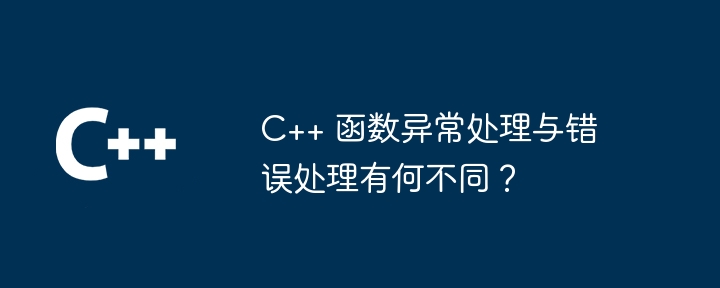
Exception handling is used to manage unexpected errors in the program, using try-catch syntax, and can be recovered; error handling manages unexpected external errors, using if statements, which are unrecoverable and the program may terminate.

Comparison of C function exception handling and error handling
Exception handling
Exception Handles unexpected situations that may occur in the management program. When an exception is thrown, it interrupts the normal program flow and transfers control to the exception handler, the catch block.
Syntax:
try {
// 可能抛出异常的代码
} catch (exception_type &e) {
// 异常处理程序
}Error handling
Error handling is used to manage unexpected program errors, which are usually is caused by external factors such as file opening failure or insufficient memory.
Grammar:
if (error_code != 0) {
// 错误处理程序
}Key differences
| Features | Exception handling | Error handling |
|---|---|---|
| Trigger | Internal error | External error |
| Control | Program interruption | Application continues execution |
| Termination | Program may Terminate | Program continues execution |
| Recoverability | Recoverable | Non-recoverable |
Practical Case: File Open Exception Handling
try {
ifstream file("myfile.txt");
if (!file.is_open())
throw runtime_error("无法打开文件");
} catch (exception &e) {
cout << "错误:" << e.what() << endl;
}Practical Case: Memory Allocation Error Handling
int *ptr = new int;
if (ptr == nullptr) {
cout << "内存分配失败" << endl;
return -1;
}When processing, Exception handling provides a more elegant and structured way to handle unexpected conditions, while error handling is used to manage unrecoverable errors, in which case the program needs to take specific recovery actions or terminate.
The above is the detailed content of How does C++ function exception handling differ from error handling?. For more information, please follow other related articles on the PHP Chinese website!
 How to solve 0xc000409 error
How to solve 0xc000409 error
 How to solve the WerFault.exe application error
How to solve the WerFault.exe application error
 The eight most commonly used functions in excel
The eight most commonly used functions in excel
 What are the differences between c++ and c language
What are the differences between c++ and c language
 Recommended learning order for c++ and python
Recommended learning order for c++ and python
 Cost-effectiveness analysis of learning python and c++
Cost-effectiveness analysis of learning python and c++
 Is c language the same as c++?
Is c language the same as c++?
 Which is better to learn first, c language or c++?
Which is better to learn first, c language or c++?




